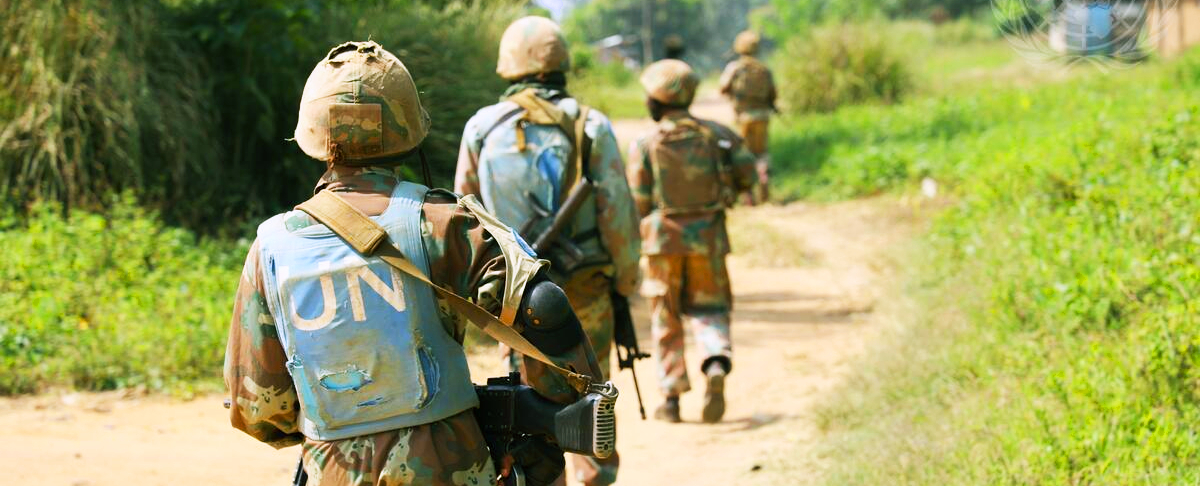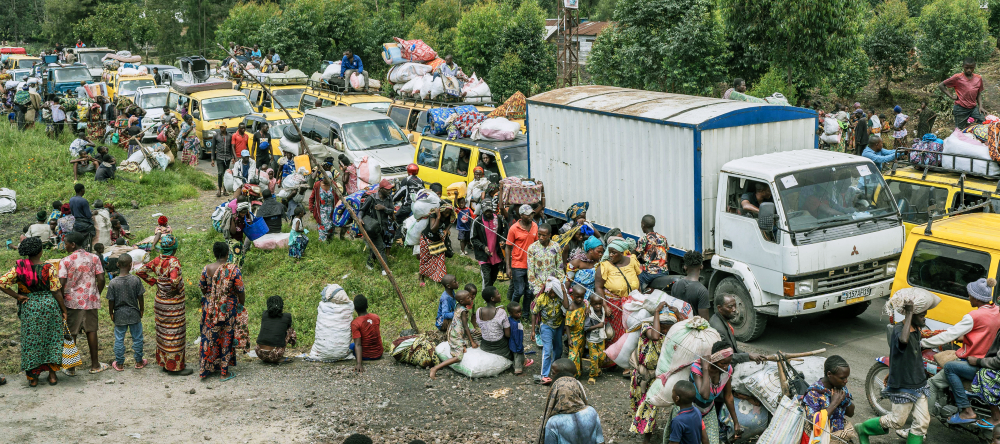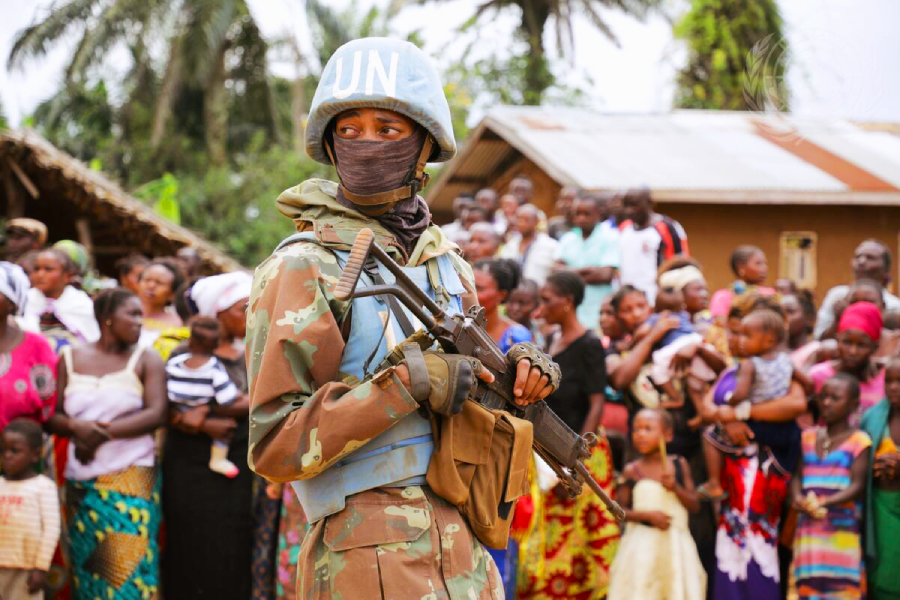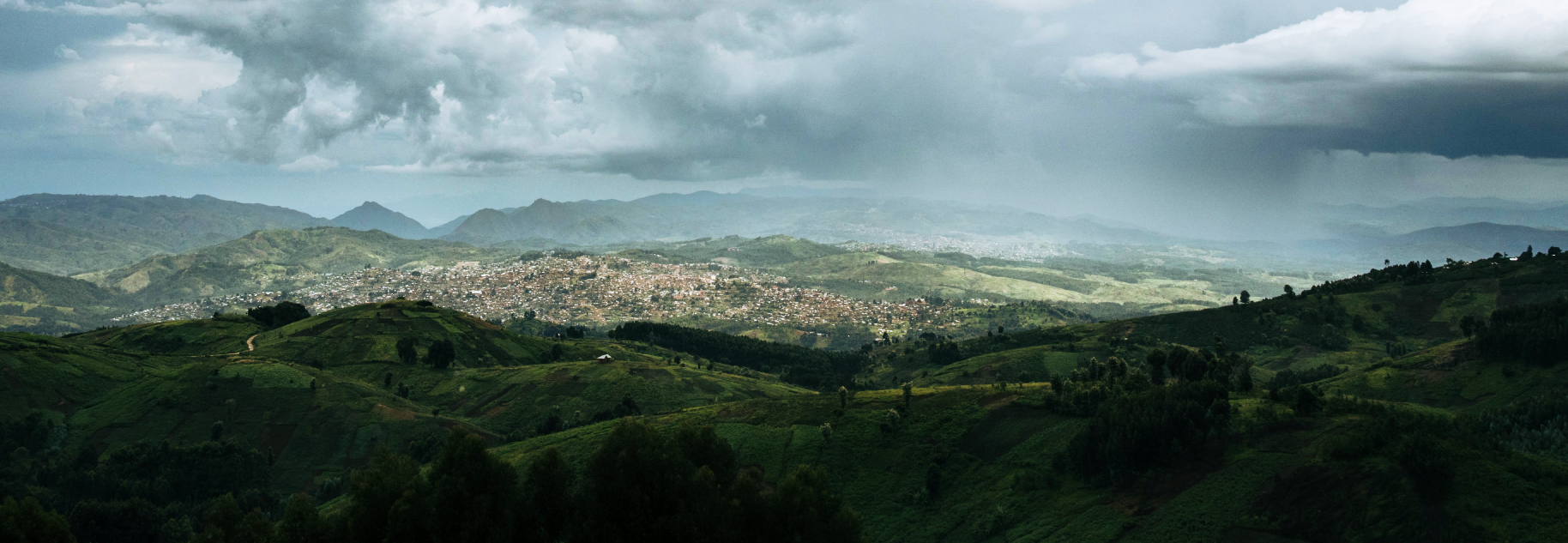English | Français

South African peacekeepers serving with MONUSCO support the Armed Forces of the Democratic Republic of the Congo in patrolling North Kivu. (Photo: UN/Michael Ali)
Within weeks of the handover of bases by the departing United Nations peacekeeping mission to the Congolese government, the posts in South Kivu province had fallen into disrepair. The illustration portends the serious troubles facing communities in the eastern Democratic Republic of the Congo (DRC). Doors and locks were smashed, power equipment stolen, and the bases were devoid of fuel, food, water, and electricity—plundered by Congolese troops. More than half of the 115 policemen assigned to occupy a base that once housed Pakistani peacekeepers have deserted. Those who remain face low morale due to lack of pay and basic provisions, begging for food from the nearby Protestant church.
The government of President Félix Tshisekedi has pushed for the complete withdrawal of the UN mission, MONUSCO, by the end of 2024. The UN’s withdrawal seems incongruent with security realities where attacks by rebels are expanding and an estimated 7 million Congolese citizens have been displaced. More than 80 percent of these live in areas protected by MONUSCO, raising the specter of a humanitarian catastrophe.
The focus on MONUSCO distracts attention from the inability of the Congolese security forces to protect its citizens.
The MONUSCO mission delivers other critical services in the region like demining, community-based early warning systems, judicial capacity building, community conflict resolution, and collaborative mechanisms for civilian protection. Successive governments have failed to provide such services for decades. Local communities perceive the military, police, and intelligence forces as part of the problem—eliciting pervasive fear and distrust.
Regional actors and illicit mining interests who benefit from instability have further contributed to the deterioration in security. The Congolese government blames MONUSCO for not being aggressive enough in battling the March-23 Movement (M23) rebel group. This has coincided with concerted anti-MONUSCO disinformation campaigns inciting discontent against the mission. The resulting tense atmosphere around MONUSCO’s operations has led to violent clashes and deaths.
Few Congolese are convinced that a government-sponsored militia force expected to replace MONUSCO or the fractious, poorly trained, and unaccountable Congolese army are up to the task. Many citizens in the east and throughout the country are fearful of the human costs to vulnerable populations currently protected by MONUSCO’s presence. These voices have largely been drowned out by heated debate over M23’s advances as well as the government’s criticism of MONUSCO. It is highly unlikely that the Congolese military can on its own provide the security needed to protect its citizens from the marauding rebels and militias who prey on communities with impunity.
A Chronic Security Deficit by Congolese Security Forces
Eastern Congo has been a vortex of deadly violence for over two decades. The main source of the conflict is fighting among the Congolese army and a complicated and ever-growing coterie of armed groups, ranging from ragtag militias run by competing business and political interests to large rebel outfits with a semblance of organized command. Some of these, like the Mai Mai and their numerous offshoots, emerged during the First and Second Congo Wars (1996-2003). Others like the Democratic Forces for the Liberation of Rwanda (FDLR) are remnants of Hutu nationalist forces implicated in the Rwanda genocide of 1994.
The M23 was once part of the Congolese army. At different periods since 2012, it has waged a brutal war over what it says is the unfair treatment of Congolese Tutsis, also called the Banyamulenge. The Congolese nationality of this community remains a touchy issue that successive governments, regional countries, and the M23 itself have all manipulated for their ends. Several reports by the UN Panel of Experts on the DRC have accused Rwanda as well as Uganda for backing different M23 factions. Both nations have supported rival Congolese groups since the late 1990s after their closely intertwined military alliance turned sour.

Congolese flee the Masisi territory following clashes between M23 rebels and government forces in February 2024.
(Photo: AFP/Aubin Mukoni)
The long dominant ruling party in Burundi, the Hutu nationalist National Council for Defense of Democracy-Forces for the Defense of Democracy (CNDD-FDD), has been accused of backing the FDLR and other anti-Rwanda forces as part of its enmity with Rwanda. However, it is also battling its own rebels on Congolese soil—some of them less than 17 kilometers from Bujumbura. Uganda is contending with its own Congo-based rebels of whom the most potent and well-armed are the Allied Democratic Forces (ADF). Remnants of another Ugandan outfit, the Lord’s Resistance Army (LRA), are also prowling the region after its main force was ejected into the Central African Republic.
Created in 1999, the United Nations Stabilization Mission in Congo (MONUC), which later became MONUSCO, was part of a larger effort by the African and international community to end the First and Second Congo wars. Its mandate included monitoring numerous peace processes, including the Sun City Accords mediated by South Africa between 2001 and 2003. These historic accords were negotiated alongside another African-led initiative, the Lusaka Peace Process, which brought all the countries backing different sides of the Congolese conflict together to end their hostilities. This created space for the internal parties to negotiate the Inter-Congolese Dialogue (ICD) at Sun City.
MONUSCO has achieved numerous noteworthy accomplishments despite the difficulties it has faced.
MONUSCO was mandated to build confidence among the state belligerents in the region, support the Lusaka and Sun City processes, and work with all conflicting parties to stick to their commitments. Its peacekeepers were also tasked with acting as a buffer between the armed actors that had either laid down their arms or lost the support of their patrons as a result of the twin peace tracks. These attempts were made in the midst of the highly volatile regional rivalries that propelled the First and Second Congo wars and their aftermath—the effects of which lie at the root of the current conflagration.
More than 120 armed groups are marauding in eastern DRC, a region roughly the size of South Sudan. Most keep splintering into factions battling to control mines and other illicit revenues. And almost all of them swell their ranks with child soldiers as young as 8 years old. The Congolese military historically has had limited effectiveness in curbing such nightmarish instability. This is largely due to practices of corruption and patronage embedded among sections of the DRC’s political and security elites. Rarely are soldiers paid on time, if at all—a serious malpractice dating back to Mobutu Sese Seko. His divide-and-rule tactics were based in part on letting soldiers fend for themselves while diverting their budgets to the powerful presidential guard. He told them, “You have guns, you don’t need a salary.”
Such criminality continues to bedevil the Congolese military, a major flaw that is cited in nearly every report of the UN Group of Experts on the DRC since 2011. Congolese security forces set up illegal roadblocks to extort citizens. They parcel off and control fiefdoms. They sell weapons to whomever is willing to pay, including the very forces they are fighting. They make deals with shadowy businessmen to pilfer minerals into neighboring countries. These practices have long been the norm.
Major African and international investments to train and equip the Congolese military have not solved these systemic problems. A significant aspect of the issue is that the larger Congolese political system has for decades been characterized by predation, impunity, patronage, and a longstanding lack of legitimacy.
Security Responses
MONUSCO has achieved numerous noteworthy accomplishments despite the difficulties it has faced. This includes helping keep the DRC unified. As a senior African diplomat has noted, without the UN mission, the DRC would likely not exist as an integrated state today. MONUSCO also elevated the DRC in the UN system and mobilized continuous engagement by the international community. It, furthermore, helped prevent the recurrence of a major conflict along the lines of the First and Second Congo wars. Finally, it reinforced civil society efforts to create awareness of human rights issues, popularized community mechanisms for civilian protection, and documented human rights violations as a means of establishing a basis for accountability.

MONUSCO peacekeepers in Kainama, DRC. (Photo: UN)
These successes were mainly due to rigorous diplomacy and a policy of aligning MONUSCO to local and regional peacemaking efforts. Nevertheless, Congolese government officials have exploited community fatigue with the seemingly endless cycles of insecurity to discredit MONUSCO and demand its departure. Part of the motivation was to galvanize political support, especially during elections. Tshisekedi went further than his predecessors in this regard by securing a timetable for MONUSCO’s complete withdrawal.
The idea of maligning MONUSCO is deeply flawed, however. It distracts from and attempts to absolve the government of its cardinal responsibility to protect its own citizens. MONUSCO’s role was always intended to be complementary to that of the Congolese armed forces. The government’s criticisms imply this responsibility is reversed. This framing also mischaracterizes MONUSCO as a fighting force that has failed to neutralize the violence.
In truth, peacekeepers are not warfighters. They monitor ceasefires and build confidence among belligerents to meet their security responsibilities. Even so, MONUSCO did introduce more robust measures. In 2013, it established the UN Force Intervention Brigade (FIB) consisting of Malawian, Tanzanian, and South African troops mandated to conduct offensive operations. That same year, the FIB defeated M23 and helped integrate some of its fighters into the Congolese military. However, the FIB was less successful against the ADF and FDLR and eventually transitioned into an “advise and assist” mission, leaving much of the fighting to ill-disciplined Congolese government forces.

The last hills and villages before the front line between the Congolese army and M23, in the south of Lubero territory, North Kivu province.
(Photo: AFP/Alexis Huguet)
In 2022, Tshisekedi asked the East African Community (EAC) to deploy a regional force against a revitalized, better-armed, and more-coordinated M23. However, he demanded their departure less than a year later, causing friction with his EAC neighbors. As these forces left, the Southern African Development Community (SADC) sent troops at Tshisekedi’s request.
Meanwhile the M23 has continued to expand its operations and is threatening to retake the regional capital of Goma. This follows the seizure of Rubaya, a mining town in eastern Congo known for producing tantalum, a key mineral used in smartphones. The M23 rebels control two of the five regions that make up North Kivu Province. In February 2024, M23 appointed its own local administration in these areas.
Congolese government officials have exploited community fatigue with the seemingly endless cycles of insecurity to discredit MONUSCO and demand its departure.
The government has raised a militia called the Wazalendo (“we are the true patriots” in Kiswahili) ostensibly to assume security responsibilities. However, it is a coterie of militiamen brought together by superstitious beliefs and lacks the credibility of an organized security force. The military says it has trained 40,000 Wazalendo in response to Tshisekedi’s call in November 2022 for vigilante groups to rise up against M23. Yet, Congolese have a fraught history of militiamen who tax them illegally, engage in gross human rights violations with impunity, recruit their children, and cause massive population displacement.
This pattern has been on display again during the 2023 elections when Wazalendo members—who wield military-supplied guns and crude weapons like pangas, knives, and clubs—harassed rival candidates and suppressed voter turnout in opposition strongholds. These threats persist with the Wazalendo preying on the population by setting up illegal roadblocks, collecting illegal taxes, and threatening or using violence. As such, these ragtag militias are symptomatic of the larger problem the country has faced with its multitude of armed groups.
Adding to the complexity and confusion over whose interests are being pursued, the government has also reportedly hired foreign mercenaries from Eastern European countries like Romania to secure key mining sites in the region.
A Misalignment of Policy with Security Trajectory
Many believe that the true intention behind the government’s push to eject MONUSCO has less to do with addressing the DRC’s myriad security challenges and more to do with reducing UN oversight of the increasingly exploitative actions of the Congolese security forces. The government opted not to bring in all stakeholders to review how MONUSCO/SADC/EAC roles could be redefined while ensuring citizen interests were protected. Introducing more militias into a region where militiamen continue to be a menace is a fraught proposition that significantly increases the likelihood of impunity and the vulnerability of local populations. Crucially, the focus on MONUSCO distracts attention from the fundamental security issue—the inability of the Congolese security forces to protect its citizens.
That failure stems in large part from the lack of implementation of security sector reform and democratic political institution-building priorities set forth in the 2003 Sun City Accords. These provided a blueprint for building a democratic state with accountable institutions, including control of the armed forces. The experience in the DRC highlights how security sector reform is intertwined with transforming the political process. An army that operates within a predatory, rentier state will be predatory itself. This is the recurring tragedy facing the DRC—and the pathway for improved security.
Additional Resources
- Glody Murhabazi, “DR Congo Police Fend For Themselves After Peacekeepers Quit UN Base,” AFP, April 30, 2024.
- Global Centre for the Responsibility to Protect, “Democratic Republic of Congo,” Populations at Risk, February 29, 2024.
- Peter Fabricius, “Once More into the Breach: SADC Troops in DRC,” ISS Today, Institute for Security Studies, February 9, 2024.
- Africa Defense Forum, “Wazalendo Add to Eastern DRC’s Complex Brew of Combatants,” Daily News, January 16, 2024.
- Paul Nantulya, “Elections in the Democratic Republic of the Congo: A Persistent Crisis of Legitimacy,” Spotlight, Africa Center for Strategic Studies, January 2, 2024.
- Coralie Pierret, “The ‘Wazalendo’: Patriots at War in Eastern DRC,” Le Monde, December 19, 2023.
- Africa Center for Strategic Studies, “Rwanda and the DRC at Risk of War as New M23 Rebellion Emerges: An Explainer,” Spotlight, June 29, 2022.
- Paul Nantulya, “Escalating Tensions between Uganda and Rwanda Raise Fear of War,” Spotlight, July 3, 2019.
- Alexandra Novosseloff, Adrianna Erthal Abdenur, Thomas Mandrup, and Aaron Pangburn, “Assessing the Effectiveness of the United Nations Mission in the DRC / MONUC – MONUSCO,” EPON Report 3, Norwegian Institute of International Affairs, 2019.
More on: Military Professionalism Peacekeeping

